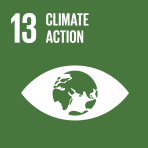 Climate Action
Climate Action
Regional collaboration for action in Asia and the Pacific
The United Nations Secretary-General’s Call to Action on Extreme Heat urges a shift from reactive measures to a strategic, whole-of-system approach that protects vulnerable populations.
Warming oceans, land, glaciers and atmosphere
Global warming, driven by rising greenhouse gas emissions, is impacting the Earth’s oceans, land, glaciers and atmosphere.
The Asia-Pacific disaster riskscape
Asia and the Pacifi c accounts for more than half of the world’s recorded disasters, with a disaster profile, or ‘riskscape’, that is both complex and continually evolving. Traditionally, the picture was dominated by tropical cyclones and droughts, but patterns are shifting.
Foreword
Extreme heat is a familiar challenge for many people in Asia and the Pacific.
Acknowledgements
The Asia-Pacific Disaster Report (APDR) is a biennial flagship publication of the United Nations Economic and Social Commission for Asia and the Pacific (ESCAP).
Asia Pacific Disaster Report 2025
Rising Heat, Rising Risk: Policy Pathways for Regional Resilience
Asia-Pacific Disaster Report 2025 offers a comprehensive and timely analysis of the growing threat if extreme heat in the Asia-Pacific region. With climate change intensifying the frequency and severity of heat-related hazards, the report presents critical insights into the multi-dimensional impacts of extreme heat on lives, livelihoods, infrastructure, and ecosystems. It provides practical, science-based solutions and regional cooperation strategies to build resilience in one of the world’s most climate-vulnerable regions. Designed for policymakers, disaster risk and climate adaptation professionals, development agencies, researchers, and regional planners, APDR 2025 transforms cutting-edges science into actionable policy recommendations. It makes a significant contribution to the global conversation on climate resilience by calling for integrated, inclusive, and forward-looking responses to extreme heat and increasingly urgent challenge for sustainable development in the Asia-Pacific.
Executive summary
The sun’s rays strike the Earth without regard for national borders. In Asia and the Pacific, rising temperatures are impacting all, everywhere.
Planning for heat resilience
Extreme heat is no longer a seasonal inconvenience. It is a systemic, cross-cutting threat, silently claiming lives, stressing economies, overwhelming cities and widening inequalities.
Extreme heat – disrupting lives, economies and ecosystems
As indicated in chapter 1, rising temperatures and heatwaves are a hazard with distinct geographic and climatic characteristics.
Recent efforts to improve the integrity and interconnectivity of VCMs
Effective carbon markets require a common foundation, where carbon credits are consistently defined, quality standards are harmonized, and transaction tracking ensures transparency over additionality, double counting and permanence.
The current landscape for voluntary carbon markets
Carbon pricing is vital for achieving a net zero global economy and truly reflecting the environmental and social costs of emissions.
Introduction
Recent estimates indicate that approximately US$7.4 trillion in climate-related investment is required annually to meet net-zero targets by 2030.Yet only about US$1.5 trillion is being mobilized each year.
The Role of Voluntary Carbon Markets in Global Climate Action
This study reviews the current state of voluntary carbon markets (VCMs) globally, with particular reference to those in developing countries. Based on a stock-taking analysis, it identifies key barriers to VCM development and explores pathways for enhancing quality and interoperability across markets.
Challenges facing voluntary carbon markets
The current lack of comparability, interoperability, and consistency among VCM standards and practices has led to investor concerns about integrity risks. It has also hindered cross-border trading and limited overall market scalability.
Acknowledgements
This report was prepared under the overall guidance of Nan Li Collins, Director of Investment and Enterprise of UNCTAD.
The way forward
Based on the stock-taking exercise and analyses presented in previous sections and drawing from recent global and regional discussions, the following suggestions try to address the challenges facing VCMs globally, as well as specifically in developing countries.
Executive summary
This study reviews the current state of voluntary carbon markets (VCMs) globally, with particular reference to those in developing countries. Based on a stock-taking analysis, it identifies key barriers to VCM development and explores pathways for enhancing quality and interoperability across markets.
